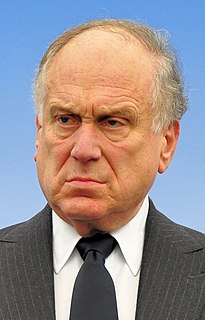A Quote by Virginia Postrel
European nations began World War I with a glamorous vision of war, only to be psychologically shattered by the realities of the trenches. The experience changed the way people referred to the glamour of battle; they treated it no longer as a positive quality but as a dangerous illusion.
Related Quotes
As Churchill said about the Great War, and he said this in about 1924, that it was the first war in which man realized that he could obliterate himself completely. If you consider the way the whole world was impacted, 18 million people worldwide died, and that is taking into account military and civilian deaths: 18 million people. And it was the whole world, if you will. You know, many of those trenches were dug by Chinese. There are photographs of Chinese looking like they just came from China, with their hats and so on, digging the trenches, right from the beginning.
The E.U. is the latest of a series of multinational organizations set up after World War II to ensure that there would never again be a pan-European war and to create the conditions for a new European prosperity after the destruction wrought by the war against the Nazis. The E.U. has admirably succeeded at both.
It's important to remember that World War II was experienced very much as a continuity in that sense. Most of World War II in most of Europe wasn't a war; it was an occupation. The war was at the beginning and the end, except in Germany and the Soviet Union, and even there really only at the end. So the rest of time it's an occupation, which in some ways was experienced as an extension of the interwar period. World War II was simply an extreme form, in a whole new key, of the disruption of normal life that began in 1914.
The rationale which accompanies that imposition of male authority euphemistically referred to as 'the battle of the sexes' bears a certain resemblance to the formulas of nations at war, where any heinousness is justified on the grounds that the enemy is either an inferior [part of the] species or really not human at all.






































